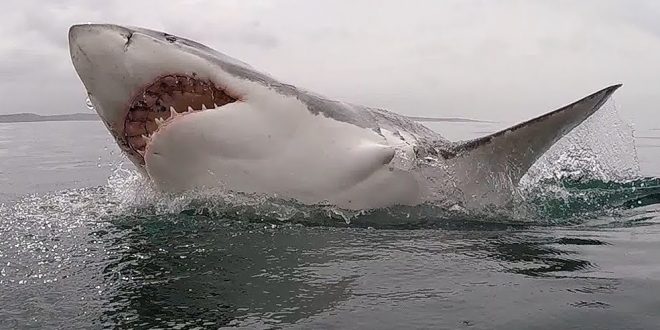Great white sharks off South Africa are in danger of dying out as nets, poachers, pollution and the depletion of fish stocks eradicate the predators.
Dr Sara Andreotti and her team, Dr Craig O’Connell and Michael Rutzen, have developed the Sharksafe Barrier, which is an environmentally-friendly artificial magnetic kelp.
They have built a small test site in what’s known as Shark Alley, off the coast of Gansbaai, where sharks are drawn in by the chance to feed on the area’s large seal population.
The team said the Sharksafe Barrier has had a 100% success rate and they were following up interest in the barriers from around South Africa and in Australia and Mozambique.
Dr Andreotti’s scientific research has taken her seven years and she said it showed that South Africa’s shark population was in double jeopardy.
Not only are there an estimated 353 to 522 of the animals left, but the South African population has the lowest genetic diversity of all white shark populations worldwide. This makes them especially vulnerable to extinction.
Dr Andreotti said the numbers were extremely low.
‘If the situation stays the same, South Africa’s great white sharks are headed for possible extinction.’
The research was made possible through funding from South Africa’s Stellenbosch University and the financial support and logistical assistance of Michael Rutzen and his company Shark Diving Unlimited.
Mr Rutzen and Dr Andreotti worked together collecting shark DNA and taking nearly 5,000 photographs of their dorsal fins. A great white’s dorsal fin is like its unique fingerprint with a specific number of notches on its trailing edge.
Dr Andreotti organised the photographs into a database which records the date when the shark was seen. To their shock, once 400 sharks were identified, they struggled to find new ones to photograph.
Dr Andreotti believes one of the main reasons for the sharp decline in white shark numbers is the impact of shark nets and baited hooks legally used on the eastern sea board since the 1950’s by the Natal Sharks Board.
Other contributing factors are poaching, habitat encroachment, pollution and depletion of their food sources.
Agencies/Canadajournal

 Canada Journal – News of the World Articles and videos to bring you the biggest Canadian news stories from across the country every day
Canada Journal – News of the World Articles and videos to bring you the biggest Canadian news stories from across the country every day

